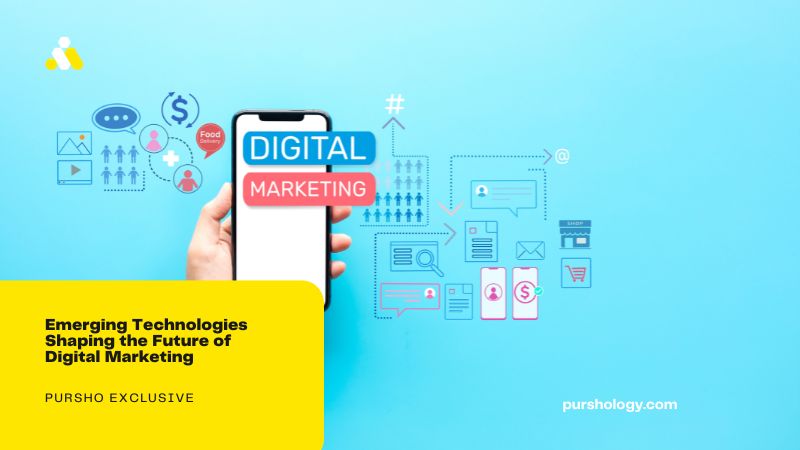As businesses and organisations adapt to digital avenues, they are revolutionising how businesses connect with their audiences. From artificial intelligence (AI) and machine learning to augmented reality (AR) and blockchain, these technologies are reshaping the future of digital marketing.
Digital Marketing Training programs have evolved to incorporate these groundbreaking advancements. Today, staying competitive in the field demands understanding these emerging technologies and their integration into marketing strategies. In this blog, we will delve into the transformative impact of these technologies on Digital Marketing Trends.
Table of Contents
- Artificial Intelligence (AI) and Machine Learning (ML)
- Augmented Reality (AR) and Virtual Reality (VR)
- Voice Search and Smart Assistants
- Blockchain Technology
- Internet of Things (IoT)
- 5G Technology
- Predictive Analytics
- Conclusion
Artificial Intelligence (AI) and Machine Learning
Beyond being just cliches, artificial intelligence and machine learning are now cornerstones of successful digital advertising campaigns. They allow for targeted advertising and customised consumer experiences by providing marketers with useful information gleaned from data research. Chatbots powered by artificial intelligence, for example, boost customer service by responding instantly and offering tailored suggestions, increasing user engagement and happiness.
Machine learning algorithms also analyse user interactions, preferences, and behaviour to improve content and advertisements. Marketers may make better decisions about advertising strategy with the help of AI-powered trend predictions for consumers. To properly leverage data-driven insights, digital marketing training increasingly places an emphasis on competency in AI tools.
Augmented Reality (AR) and Virtual Reality (VR)
Augmented and virtual reality in consumer interactions is changing the game. When compared to virtual reality, augmented reality simply superimposes digital content over the physical world. Both may greatly enhance digital marketing campaigns by generating engaging and interactive content.
To improve the shopping experience, retailers implement augmented reality features that let shoppers see things in their own environments before buying. Conversely, virtual reality enables storytelling in engaging, immersive spaces, transforming content marketing. In order to make a lasting impression on their brands, digital marketers are looking for methods to use these technologies.
Voice Search and Smart Assistants
Marketers are rethinking their approaches to cater to a future where speech is central, thanks to the proliferation of voice search and smart assistants. The proliferation of smart speakers and smartphones with speech recognition capabilities has made optimising content for voice search inquiries critical. Conversational, long-tail keywords and providing concise, relevant responses to voice inquiries require marketers to modify their SEO tactics.
Additionally, smart assistants provide new channels for brand engagement such as Google Assistant and Amazon’s Alexa. Branded abilities and activities, voice-activated advertisements, and other novel uses of these platforms are being investigated by marketers.
Blockchain Technology
Blockchain is slowly but surely establishing its impact on digital marketing despite its original link with cryptocurrency. Ad fraud, data privacy, and digital advertising transparency are just a few of the problems its decentralised and open architecture aims to solve.
Marketers may improve the honesty and openness of their campaigns by using blockchain technology, which verifies the authenticity of ad impressions and interactions. Additionally, it allows for more accurate targeting by giving marketers access to verified consumer data without compromising their privacy.
Internet of Things (IoT)
Digital marketers now have more chances than ever because of the Internet of Things (IoT), which has completely changed how gadgets connect and interact. From smart household appliances to wearable gadgets, there is an abundance of data generated by IoT devices. Marketers may use this data to better understand customer preferences and behaviour.
One example is the possibility of hyper-personalised marketing made possible by gadgets powered by the IoT. Marketers can utilise real-time data received from connected devices to provide personalised content or offers. In addition, the Internet of Things allows marketers to integrate data from different touchpoints to build omnichannel experiences, which provide customers with a consistent trip across devices and platforms.
5G Technology
Due to its revolutionary connection and speed, 5G technology is set to revolutionise digital marketing. Thanks to its improved network capabilities, 5G allows users to enjoy uninterrupted streaming of high-quality films, more realistic augmented and virtual reality experiences, and faster website and app loading times.
With 5G’s speed and dependability, marketers can provide customers with better content experiences. Advertising campaigns will be able to captivate audiences with more immersive and engaging content as high-definition movies and interactive material become more widely available. Instantaneous interactions and tailored content distribution are both made possible by 5G’s enhanced connection and decreased latency, which pave the way for real-time engagement methods.
Predictive Analytics
Predictive analytics use sophisticated algorithms and data analysis approaches to foretell future trends and behaviours by analysing patterns in previous data. Proactive and focused marketing methods are made possible by this technology, which allows marketers to anticipate consumer demands, preferences, and behaviours.
Marketers can improve their campaigns in many ways by using predictive analytics. This includes anticipating customer churn, finding high-value leads, and making content suggestions that are more tailored to each individual. This data-driven method improves decision-making, which in turn helps marketers better manage resources and create campaigns that connect with their audience, leading to a higher return on investment.
Conclusion
Understanding and leveraging emerging technologies like AI, AR, VR, voice search, and blockchain is pivotal for marketers aiming to stay ahead in the ever-evolving digital realm. Embracing these trends can empower businesses to forge deeper connections with their audience, optimise marketing efforts, and drive growth in the competitive digital space.




